When both of my sisters recommended the same game to me, I knew I would like it. Since I was four, I have often played games I’ve seen my sisters playing and vice versa. When one of them mentions a game, I usually look it up. When both of them mention a game, I’m in.
In this case, the game was the Jules Verne-inspired visual novel travel experience, 80 Days (2014 for mobile, 2015 for PC and Mac). I will structure this post around several kinds of iteration around the game. My implicit argument is that the game creates a compelling experience and world through several kinds of iterations, some driven by the game design and some through player behavior.
Iteration Type 1: Adapting Verne
Adaptation is a kind of iteration: remaking something for a new context.
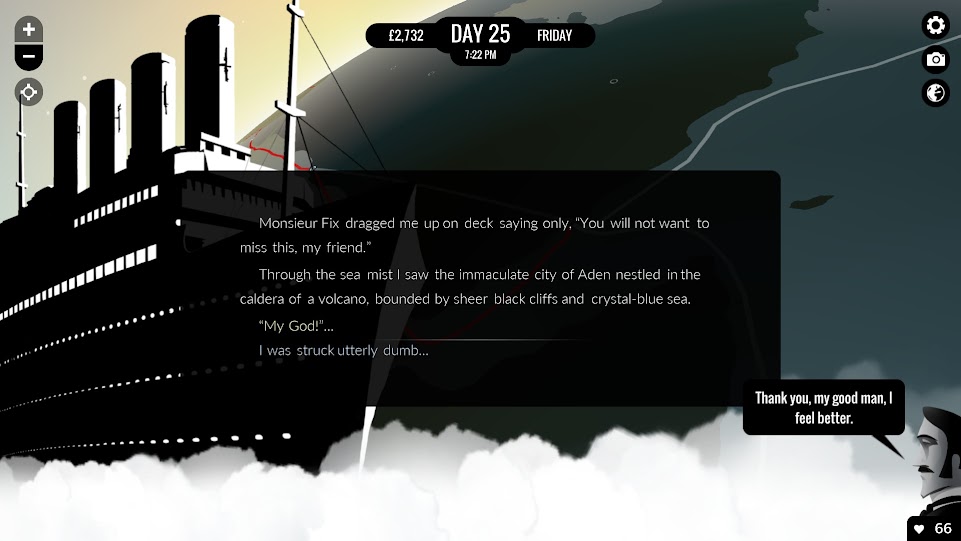
In this case, the premise of a game is already contained in the title Around the World in 80 Days. In this title is the key objective: get around the world within 80 days. Then, if a player knows anything about the novel, they have some idea of what would be important to such a game: methods of travel, like trains and steam ships; varied locales spanning several continents; managing money carefully to not run out; tending to the relationship between gentleman (Phileas Fogg) and valet (Passepartout). So a broad array of possible mechanics and narrative implements unfold themselves from the basic premise of the novel.
But the developer Inkle does not stop with a direct adaptation. Adapting a 19th century English novel to a 21st century British game, they add some welcome updates. Two specific tropes are closely bound together:
- Steampunk, specifically advanced airships and automata
- Resistance to colonialism, including advanced countries outside the “West”
So Passepartout (the player character) and Phileas Fogg travel a world different enough from my understanding of the late 19th century to offer plenty to think about.
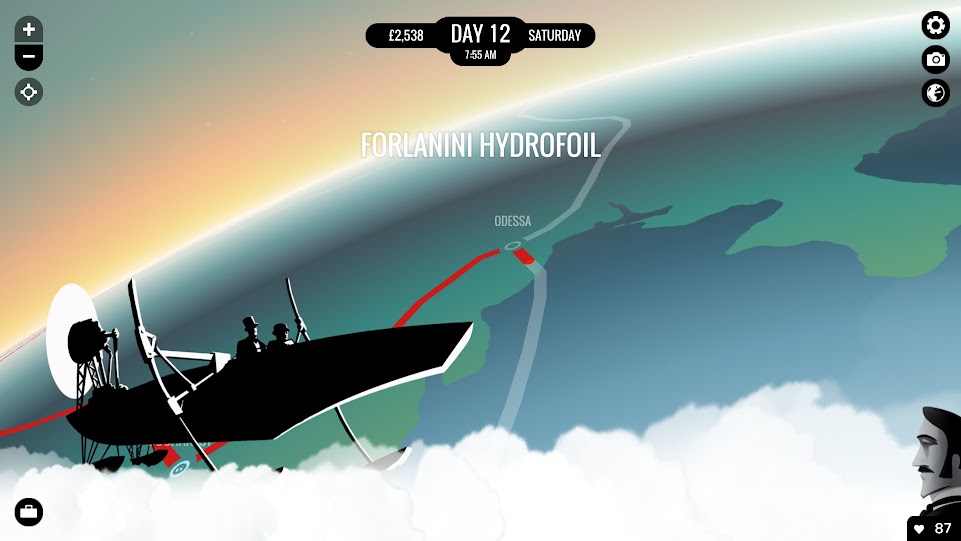
The first trope is more immediately noticeable. As players journey from town to town, they have a choice of routes, and each route has a method of conveyance. The first time I was on an airship, I thought, “This isn’t the 1870s I know.” Indeed, there are also steam cars and other fanciful contrivances. There is also a powerful crafting guild and automata, or artificially-built sentient beings.
More details on both tropes then emerge over several playthroughs of the game via dialogue and mechanics. To travel through a specific continent is to explore an alternate history where something is going on, from anti-automata rebels to a robust, advanced Zulu empire. How we discover all this brings me to a second kind of iteration.
Iteration Type 2: From City to City
The basic gameplay loop involves arriving at a city, buying and selling things, discovering departure routes, and then following a route to the next city. During exploration, hotel stays, and travel, various narrative events may occur that affect money and health, give information on new routes, or change destination. Simple choices determine what happens.
A typical game may involve travel between 15 or more cities, with narrative events occurring at least once each day. For example, Passepartout can choose between two train passengers to strike up a conversation with. In a more complex event chain, Passepartout may choose between several actions which affect a later event, like solving a murder case or possibly instigating or stopping a mutiny.
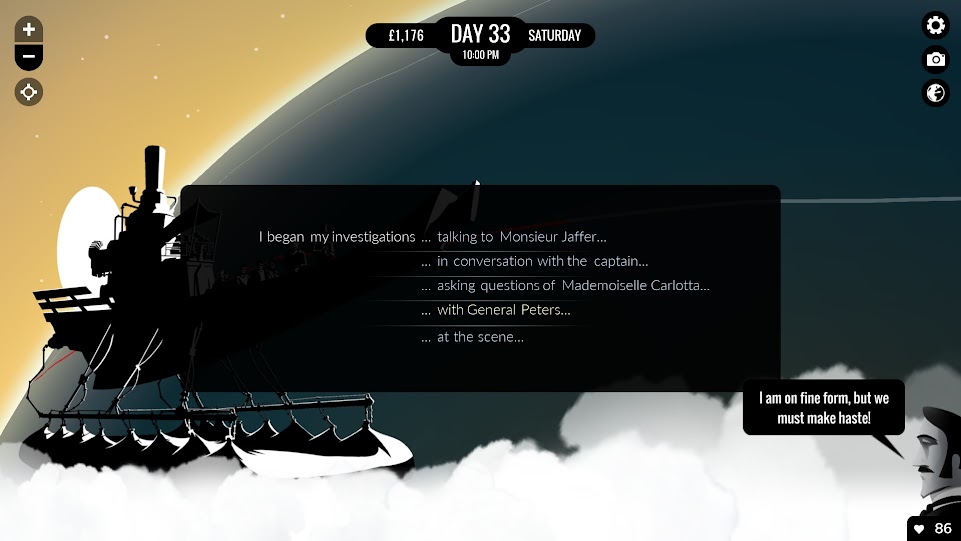
Most cities have markets with items to buy or sell. Sometimes items are much more valuable in one to four specific cities, so part of the game can involve holding onto items with the hope of funding the trip based on selling them. In my experience, I often ended up missing the cities for the items I held, as expediency or narrative choices would lead me in a different direction.
What I love most about the repetition of the city/travel loop is that it’s a predictable pathway for disseminating unpredictable nuggets of narrative and worldbuilding. In 80 Days, characters on one continent will sometimes hint at events that end up occurring on other continents. Or they will mention a world detail that can be explored more if you go in that direction, like mentioning the large machines digging up a canal in Panama.
Iteration Type 3: Playthrough to Playthrough
Each playthrough of 80 Days has taken me between 1 to 3 hours, depending on how quickly I read and what route I take. Each route has affected the path I take on the next route and, hence, what more I explore in the game world. So far, I would label my routes thus:
- Route 1: Blundering Through in 108 Days
- Route 2: An Expeditious Circuit in 62 Days
- Route 3: I Go to the North Pole and Come Back Around in 46 Days
- Route 4: I Disappoint an International Thief in 78 Days
- Route 5: We Stay in No Hotels and Knock Out Jesse James in 56 Days
- Route 6: I Travel with Captain Nemo but Arrive a Bit Late in 82 Days
One thing I love about each playthrough is that a narrative emerges out of the mess of various cities, routes, and threads.
The first playthrough is the hardest to pull together into a narrative, because at that point I didn’t know enough about the game to know what kinds of stories it was telling. Everything was new and possibly remarkable, which makes it hard to highlight any single through-line. In that playthrough I ended up pursuing an automata storyline pretty far. I also bounced around Europe far more than I have in any playthrough since: it took me 19 days to leave Europe, hardly an auspicious beginning.
Fortunately, the game doesn’t end when you reach day 80. Phileas Fogg resolves to stick out the travel until the return to London. With that, one of my future planned playthroughs is to travel to as many cities as possible, taking as much time as I can.
Each subsequent playthrough built off of that first one. Route 2 was basically my first route, but better. I left Europe more quickly and found a more direct way around southeast Asia and through the Americas.
One fun element of iteration is noticing the pattern and trying one thing to make it different. In Route 3, I basically asked, “What if I go as far north as I can?” That turned into going the most north to the North Pole, while entering one of my favorite newly-written segments of 80 Days. Without spoiling too much, the Arctic contains both competing guildspeople trying to reach the North Pole and indigenous groups that seek to protect their domain. Such a route ends up being relatively linear, but I’m glad I experienced it for a playthrough.
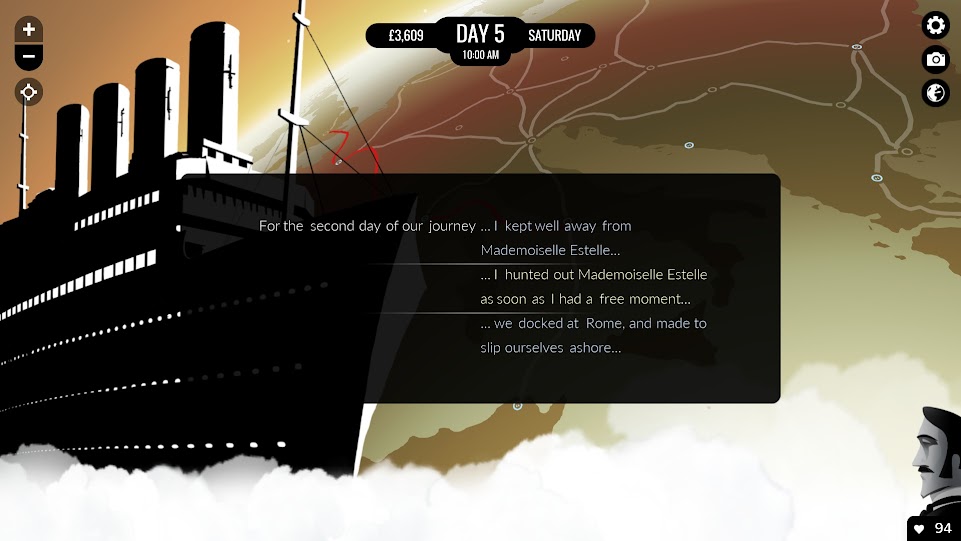
Sometimes new elements would interrupt my initial plan and I would improvise. In Route 4 I started out trying to go as far south as possible, but the game pulled a surprise on me by introducing the Black Rose, Mademoiselle Estelle. She is introduced in two story events on board a train, where Mademoiselle Estelle appears as an engaging and unchaperoned traveller. Simultaneously, another passenger has his cigarette case go missing, alongside rumors of an international thief, the Black Rose. It’s not surprising that Estelle and the Black Rose are the same person. It is surprising that she insinuates herself into the entirety of my adventure, first as traveling companion (with Phileas Fogg acting suitably aloof at the tag-along) and then as co-conspirator in a possible heist. The emergence of this journey-spanning event motivated me to travel as quickly as possible.
I knew what she wanted and where to find it, but perhaps I messed something up in my pursuit of it. I reached the spot she wanted, but she was nowhere to be found. Then, when I almost reached home, she appeared and was furious for my failing to help her. No dialogue option would assuage her. On the one hand, I appreciate the game letting me fail the event for hard-to-scrutinize reasons. Sometimes travel is like that: maybe I didn’t meet up with her in a way I should have. On the other hand, I peeked at a guide and found there is a positive way to resolve the quest, so I feel disappointed at having missed out.
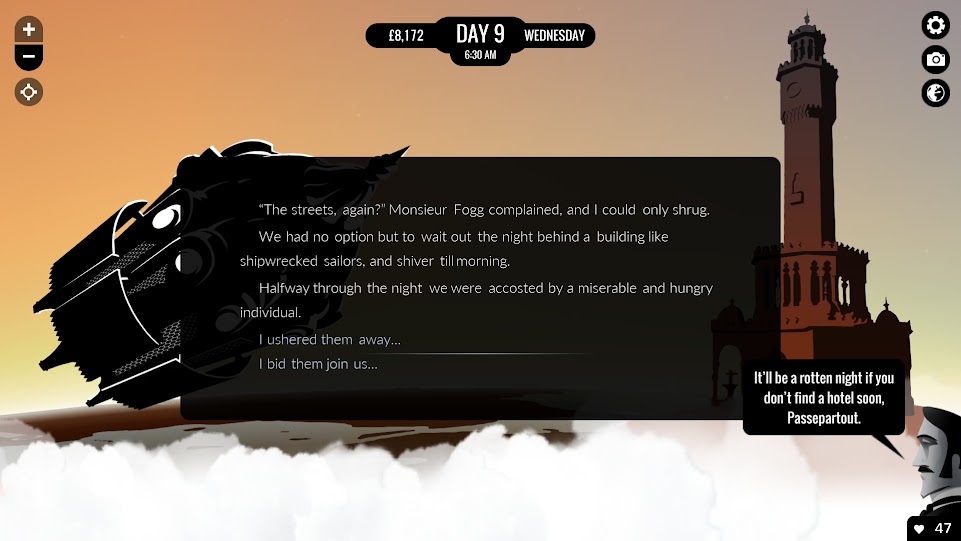
Once, I iterated by refusing to use a mechanic in the game. Route 5 was an experiment based in seeing a Steam achievement for not staying in any hotels. (Most overnight stays at cities involve hotels: a short event followed by increased health and time passing.) I was pleased how the game seemed to anticipate skipping out on hotels: Phileas Fogg gets increasingly perturbed at his valet’s incompetence at finding lodging. Health, a mechanic I usually don’t need to pay attention to, suddenly becomes important to manage, as I have to use all the other valeting tools I have to make up for losing 10 out of 100 health every day we are not in a hotel. One advantage was spending less money on lodging, which alongside a lucky run on selling goods, meant I ended the trip with over 16,000 pounds. (In most runs I barely break even; the game encourages spending a lot on traveling more quickly.) Knocking out Jesse James on a train ride through the US was just a fun accident along the way.
Finally, in Route 6 I went as far south as possible without interruption, saw the impressive Zulu empire at a distance, and then ended up in a submarine consumed by no other than Captain Nemo’s submersible Nautilus. It was a cool event chain, and I’d love to experience it again sometime while making different choices.
So with each route there was substantial variation based on what path I took. In addition, different gameplay approaches (Route 5), more heavily scripted routes (especially Route 3) or randomly triggering quests (Route 4) provided additional layers of replayability. That said, one additional element sometimes worked to make these routes slightly more consistent: my own conception of Passepartout.
Iteration Type 4: My Willingness to Make Different Choices
The game involves roleplaying as Passepartout, the servant to gentleman Phileas Fogg. One can be more or less deferential to Fogg, more or less thrill-seeking, and so on. Basic character qualities are given a qualitative descriptor in the menu.
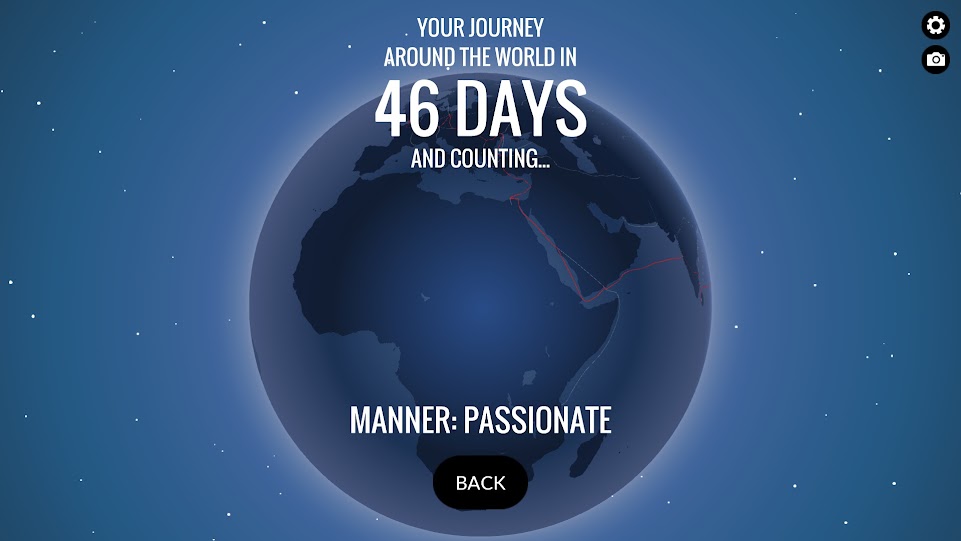
Roleplayers commonly fall into patterns based in part on their own personality, and I’m no different. As a roleplayer, I tend to similar choices from playthrough to playthrough unless I deliberately create a different character in my head at the start. My default Passepartout tends to take altruistic actions with some risk, tends to respect Phileas Fogg, and tends to open up conversation but not press beyond what might be socially appropriate.
Consequently, when I have encountered the same events multiple times, I tended to see the same result or only a slightly different result. For example, the route from Yokohama to Honolulu features a murder mystery. The first time, I dutifully interviewed and explored the crime scene and managed to solve the mystery. The second time, I did the same thing. Would I see a different result if I played it differently? Yes, probably. But it’s hard for me to switch my approach mid-route.
So one of the things I want to do on subsequent routes is try to commit to a new alter persona, and see how things unfold differently. I think the narrative choices are varied enough in the game that this won’t just be a “be an egregious ass” playthrough. But we’ll see. That brings me to the last kind of iteration I want to discuss.
Iteration Type 5: It’s About the Journey
In writing this post, I have hit on one other kind of iteration, namely iteration in reflecting on my experiences with the game. Each playthrough and each section of this post have helped me think through what the experiences consisted of and what they meant to me. I have also been exploring iteration itself.
Etymologically, the Oxford English Dictionary claims iteration is based in the word again. It comes from Latin, iterationem (Wiktionary), which in turn comes from itero (repeat, do again; Wiktionary), from iterum (again; Wiktionary).
But when I started writing this post, I thought iteration could be related to the Latin word iter, meaning journey, course, or road (Wiktionary). How fitting, I thought, to write about a game about travel through the lens of iteration. That did not pan out (the two words may be unrelated). Iteration taught me that, too.
Still, iteration is about the journey, that is, exploring possibilities on a path, seeing results, and trying again.
Leave a Reply